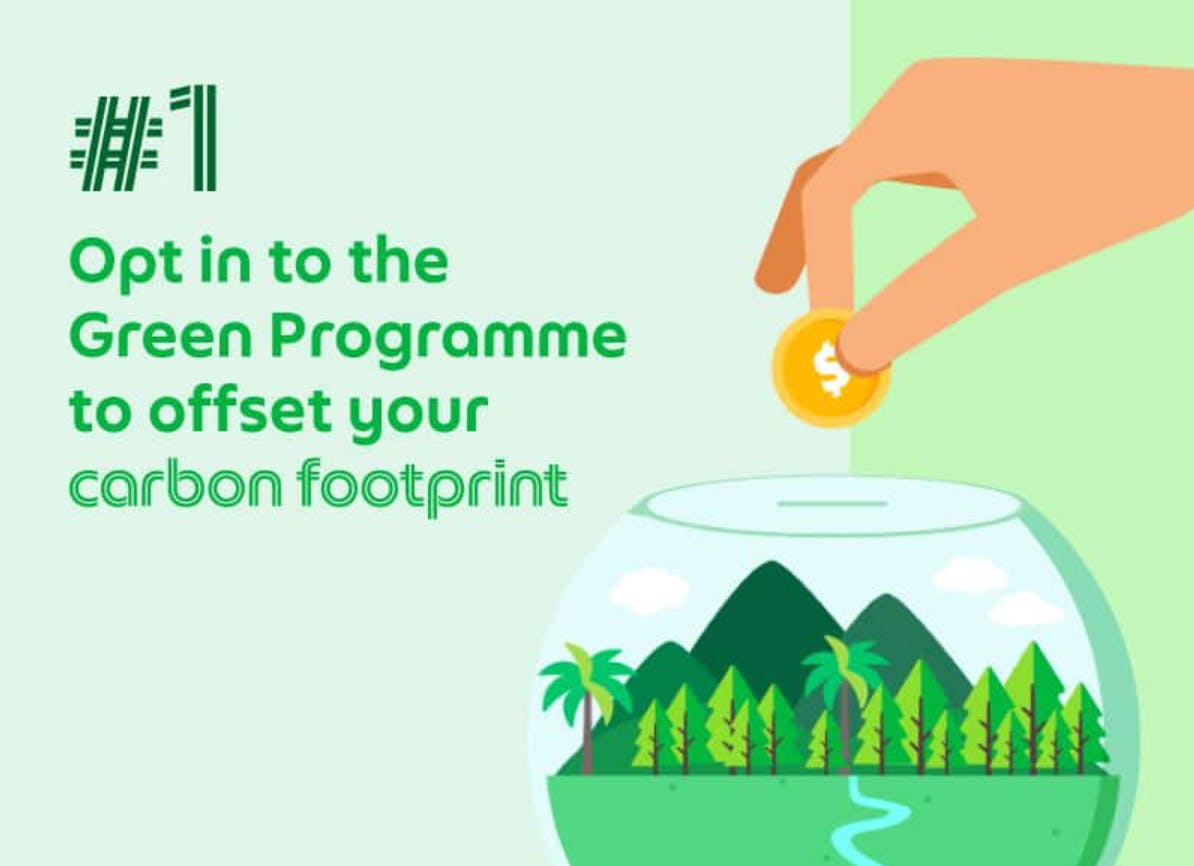Grab has dropped the term “carbon neutral” from a controversial offsetting scheme it launched in 2021 that charges customers for reducing the climate impact of their journeys.
To continue reading, subscribe to Eco‑Business.
There's something for everyone. We offer a range of subscription plans.
- Access our stories and receive our Insights Weekly newsletter with the free EB Member plan.
- Unlock unlimited access to our content and archive with EB Circle.
- Publish your content with EB Premium.
The firm’s carbon offsetting initiative, which was previously referred to as a “carbon neutral fee”, is now called the “Green Programme” in all of its markets in the region.
In response to queries from Eco-Business, which was alerted to the name change by Malaysia-based environmental watchdog RimbaWatch, Grab said that it has consistently referred to the scheme as the “Green Programme” in Singapore, and its latest move is a bid to harmonise the branding for the scheme across its markets.

Grab has changed the name of its offsetting scheme to “Green Programme” across the region, dropping the term “carbon neutral”. Image: Grab.com
Grab has a presence in eight Southeast Asian countries currently, including Malaysia, Indonesia, Thailand and the Philippines.
It refuted charges by RimbaWatch that the branding shift was prompted by upcoming regulations, such as the European Union’s Green Claims Directive, which will ban the use of terms like “carbon neutral” without substantive evidence.
“Independent of forthcoming regulations, our priority has always been to act responsibly – by providing transparent information and avoiding misleading environmental claims in our communications with users,” it said in its email reply.
The company added that it remains committed to supporting “credible, high-impact environmental efforts across the region” and that it will continue to communicate its work responsibly and accurately.
The latest change “reflects the programme’s broader environmental ambition – encompassing support for nature-based solutions, technological innovations, and community initiatives that help mitigate environmental impact across Southeast Asia”, it said.
Last week, RimbaWatch – which had called into question the credibility of Grab’s initiative last year – informed Eco-Business to the name change. It said that scrutiny of carbon neutrality claims and forest-based carbon offsets has increased globally and shared its observation that Grab could have taken these developments into account and removed the “carbon neutral” term from its branding.
The practice of promoting an activity or product as carbon neutral solely based on the use of offsets has been explicitly banned by both the EU and United Kingdom through their updated advertising laws, RimbaWatch said in a statement shared with Eco-Business. Separately, energy firm EnergyAustralia was forced to apologise for misleading consumers with its own carbon neutral programme earlier this week, the non profit noted.
RimbaWatch said Grab’s latest move is “significant” as it ends a period of “misleading claims” made about Grab’s offsetting function to its customers by implying that they could neutralise their environmental impacts through a fee.
It also aligns Grab with international consensus on the “ever-shrinking role of offsets, and hopefully directs Grab towards prioritising real-world emissions reductions rather than relying on unproven and hypothetical carbon markets,” RimbaWatch said.
Grab’s move should “send a signal to the region, warning other regional players that relying on carbon offsets is increasingly archaic as the need for effective mitigation becomes increasingly clear,” it added.
Grab’s offsetting scheme enables its customers to “neutralise” the emissions of their travel or deliveries, with a fee of S$0.10 (US$0.07) for each trip that goes towards the purchase of carbon credits. RimbaWatch has questioned its credibility, especially the scheme’s use of credits bought from a carbon project – the Katingan Mentaya peatland restoration project in Central Kalimantan – that an investigation by Greenpeace concluded was ineffective at reducing emissions.
Grab has since defended the scheme, stating that it is top-rated and listed on carbon exchanges including Bursa Malaysia’s Carbon Exchange and Temasek-backed Climate Impact X in Singapore. Permian Global, a carbon finance firm that manages the Katingan Mentaya project, has also rejected the allegations and defended its climate impact.
Carbon credits are “a legitimate financial instrument for long-term environmental good,” Grab said in a statement last year.
On its website, Grab claims that its offsetting feature has avoided 380,000 tonnes of greenhouse gas emissions through the purchase of carbon credits from Katingan Mentaya since 2021. The company has not changed its 2040 carbon neutrality pledge, which is also promoted on its website, Eco-Business understands.
Carbon offsetting is the most common form of greenwashing in Southeast Asia, according to a study by RimbaWatch of cases of exaggerated or false sustainability claims in the region since 2020.
Observers have pointed to how the EU Green Claims Directive – which is still working its way through the EU’s legislative system – will bring about closer scrutiny of corporate green claims globally, particularly on the use of carbon offsets to underpin sustainability credentials in marketing communications.










